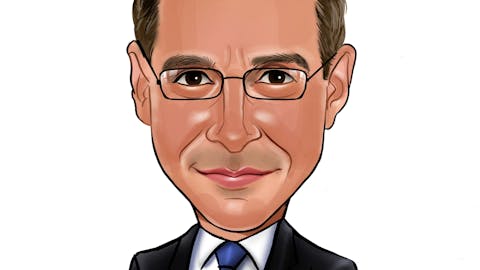OrbiMed Advisors LLC is the world’s largest healthcare-focused investment firm, managing roughly $15 billion in net assets under management. The healthcare investment firm, which started its first public equity fund in 1989, is managed by one of the most closely-watched and hallowed investors in the life sciences industry, Samuel Isaly. Mr. Isaly’s New York-based firm has been investing for more than 20 years across the entire healthcare space, from early-stage private companies to large multinational corporations. OrbiMed Advisors has been highly-successful in recent years with regard to performance, which can be attributed to the firm’s team of more than 80 scientific, medical, investment and other professionals. To be more detailed on OrbiMed’s performance, the investment firm generated an 18.9% net annualized return since January 1993 through the end of 2014, significantly above the return of 7.7% for the MSCI World Index over the same time span. For that reason, retail investors looking to engage in the business of investing in healthcare should definitely take a look at Mr. Isaly’s equity portfolio.
Follow Sam Isaly's OrbiMed Advisors
At Insider Monkey, we track around 730 hedge funds and institutional investors. Through extensive backtests, we have determined that imitating some of the stocks that these investors are collectively bullish on can help retail investors generate double digits of alpha per year. The key is to focus on the small-cap picks of these funds, which are usually less followed by the broader market and allow for larger price inefficiencies (see more details about our small-cap strategy).
On April 1, 2015, exactly one year ago, renowned investor Sam Isaly discussed the healthcare sector on CNBC, as well as revealed four top stock picks that his team adored at the time. Mr. Isaly told CNBC that valuations in the healthcare space were higher than in previous years, but there were not crazy – they were “sensible”. The highly-experienced investor voiced his views that the healthcare industry as a whole was not in a bubble at the time, but he did point out that there were some overvalued subsectors within the industry. According to OrbiMed’s Managing Partner, the small, discovery-stage biotech subsector, tracked by SPDR S&P Biotech ETF (XBI), was extremely overvalued at that point in time. Mr. Isaly turned out to make an accurate statement, considering that the SPDR S&P Biotech ETF is down 32% in the past 12 months. Having said that, let’s discuss the four stock picks highlighted by the healthcare-focused investor during the discussion with CNBC, which included Regeneron Pharmaceuticals Inc. (NASDAQ:REGN), Actelion, Molina Healthcare Inc. (NYSE:MOH), and Health Net Inc. (NYSE:HNT). But why would anyone go back in time and check whether Mr. Isaly’s enthusiasm on the four companies has been rewarding? Surely, there isn’t anyone out there who can accurately predict the future, particularly when it comes to equity investing, but retail investors should get a better idea of whether hedge funds’ opinions tend to be informative and accurate or not by examining their past statements. Truth be told, investors should learn to filter sound investment theses voiced within the hedge fund industry; and this article will focus on examining Mr. Isaly’s bets (not that we seek to undermine his industry acumen).
Let’s begin our discussion with Sam Isaly’s favorite stock at the time of the CNBC interview, Regeneron Pharmaceuticals Inc. (NASDAQ:REGN). According to the 13F filing for the first quarter of 2015, OrbiMed Advisors owned 539,000 shares of Regeneron on March 31, which were valued at $161.85 million. The New York-based investment firm owns a slightly lower stake of 483,000 shares as of December 31, which was worth $262.21 million at the end of the year. Nonetheless, Regeneron’s shares have been on a slide since the beginning of 2016, declining by 33% year-to-date. The stock is down by 17% over the past year, so let’s find out what has been weighting on the company’s stock performance in recent months. Regeneron Pharmaceuticals is a fully-integrated biopharmaceutical company focused on discovering, inventing and developing medicines for the treatment of various medical conditions. The company currently commercializes medicines for eye diseases, high low-density lipoprotein (LDL) cholesterol, and a rare inflammatory condition.
Apparently, Regeneron’s shares have been pressured by the intensifying drug pricing debate in the United States. Just recently, the Centers for Medicare and Medicaid services (CMS) proposed a pilot pricing model to reduce spending on expensive drugs, with rules applying to Medicare Part B. Regeneron’s EYLEA (aflibercept) Injection, which accounted for 65% of the company’s total revenues in 2015, is covered by Medicare Part B, so the aforementioned pilot pricing model will definitely put some weight on the company’s top-line results. EYLEA Injection is available in the United States, European Union, Japan, and other countries for the treatment of neovascular age-related macular degeneration (wet AMD), diabetic macular edema (DME), and other conditions. EYELEA net product sales totaled $2.68 billion in 2015, up from $1.74 billion in 2014. The smart money sentiment towards the biopharmaceutical company slightly increased in the fourth quarter, with the number of funds invested in the company increasing to 35 from 32 quarter-on-quarter. Two Sigma Advisors, founded by John Overdeck and David Siegel, owns 253,667 shares of Regeneron Pharmaceuticals Inc. (NASDAQ:REGN) as of December 31.
Follow Regeneron Pharmaceuticals Inc. (NASDAQ:REGN)
Follow Regeneron Pharmaceuticals Inc. (NASDAQ:REGN)
Receive real-time insider trading and news alerts
OrbiMed Advisors’ 13F filings for the first quarter and fourth quarter 2015 did not disclose any shares of Switzerland-based biopharmaceutical company Actelion Pharmaceuticals, which was yet another high-potential company emphasized by Mr. Isaly during the CNBC interview. So let’s take a look at the remaining stocks highlighted by the highly-scrutinized investor. As revealed in the 13F for the first quarter of 2015, OrbiMed Advisors owned 2.25 million shares of Molina Healthcare Inc. (NYSE:MOH) at the end of March, which were worth $84.62 million. The healthcare-focused investment firm cut its stake in Molina by a whopping 2.67 million shares during the December quarter, ending 2015 with only 568,850 shares.
The provider of Medicaid-related solutions has not performed quite well either in the past year, with its shares declining 4% in the past 12 months. It should be noted that the stock is up by 7% year-to-date, so the company’s performance through the end of 2015 was even worse than the 4% decline (the stock lost more than 10% since April 2015 through the end of December 2015). The smart money sentiment towards the insurer declined notably in the December quarter, as the number of funds tracked by Insider Monkey with stakes in the company dropped to 24 from 30 quarter-on-quarter. Insurer Molina Healthcare has enjoyed a strong performance in 2016 due to surging enrollments (as a result of lower premiums), which increased the company’s overall market share remarkably. Cliff Asness’ AQR Capital was very bullish on Molina Healthcare Inc. (NYSE:MOH) during the fourth quarter of 2015, ending the year with 1.23 million shares.
Follow Molina Healthcare Inc. (NYSE:MOH)
Follow Molina Healthcare Inc. (NYSE:MOH)
Receive real-time insider trading and news alerts
Last but not least, OrbiMed Advisors owned 2.56 million shares of Health Net Inc. (NYSE:HNT) at the end of March 2015, as compared to the 2.99 million-share stake held on December 31. The latter stake was valued around $204.61 million. In July 2015, health insurer Centene Corp (NYSE:CNC) sealed an agreement to acquire managed care organization Health Net for $28.25 in cash and 0.6220 of one Centene share. Earlier this month, Clayton-based Centene announced the completion of the merger, which created the largest Medicaid managed care organization in the country. The 2.56 million-share position held by OrbiMed Advisors at the end of March 2015, which was valued at $87.07 million, would have been worth $170.36 million at the moment (the sum of the cash consideration received upon the completion of the merger and the current value of Centene common stock received following the acquisition).
Disclosure: None





